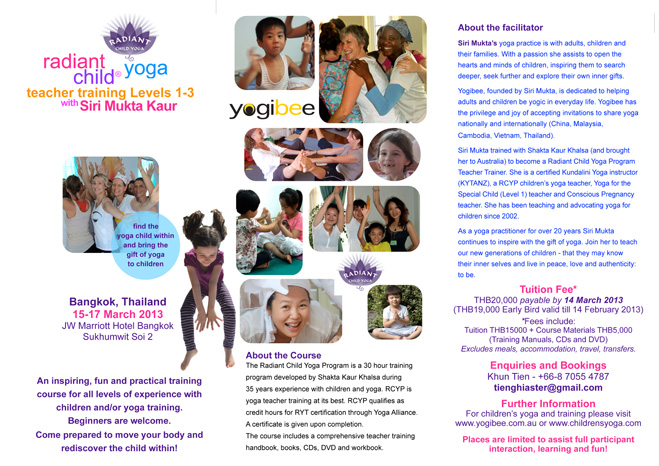Yogibee RCYP Print Out Click Here 1-3 Bangkok_15-17Mar2013
HELPING OUR CHILDREN TO SELF MANAGE THEIR BEHAVIOUR
by Siri Mukta Kaur
Imagine a world where children were totally confident in their abilities and could use their skills to make the world a better place to live in.
Children’s behaviour often reflects to the world what is going on inside for themselves. If children feel lost, concerned or angry, then those around them will see their emotions reflected in what would be seen as socially unacceptable behaviours. In contrast, a child who is happy and calm, is able to adapt to situations that arise and behave appropriately.
They are more adept at using their inner skills to solve problems as they arise.
Helping children to understand themselves goes a long way to helping change their behaviours.
Yoga is one way that children can learn to understand more about themselves in a positive and meaningful way. Yoga offers children an opportunity to role play various animals and objects from nature. After all, the ancient yogis developed the original yoga poses by watching and observing nature.
By playing out the various poses children can take on the personas of those animals and behave in ways that are out of character for them in a safe environment. A child who is usually noisy will have an opportunity to be quite as they do Tortoise Pose, whilst a usually quiet child can be noisy and boisterous whilst roaring loudly like a lion.
Children learn in a non-competitive way how to understand their feelings, and express themselves in different ways. They can also be creative and do what feels right for them during a yoga class.
Other benefits of yoga include the physical activity. Children get to stretch their bodies in different ways, learning how their bodies move, understanding its limitations and also how flexible it can be.
Through yoga games children also learn about being true themselves and others, about honesty, how to be strong for themselves and support others. Cooperative games are the key in children’s yoga classes. Competition is replaced by working together to achieve a common goal.
One great cooperative game for children is a game where they have to help each other to get up from a sitting position.
1. The children sit in pairs, cross legged and back-to-back.
2. They link their elbows together at the side.
3. Supporting each other, and without putting their hands on the ground they try to stand up together.
4. They have to cooperate and lift together at the right time to be able to stand up.
5. Without helping each other it will be difficult to get up.
Children can also be taught simple breathing activities that will help them in situations they find themselves in. Breathing is vital, yet most people do not realise that the breath can be used in certain ways to help manage how we feel. Children can easily become angry and frustrated throughout a regular day. Simply by learning a cooling breath technique, children can calm themselves down when hot and when bothersome situations arise. Next time a child feels upset or angry encourage them to try the following breath:
1. Curl your tongue (lie a straw shape) and hang it over your lower lip or place your tongue along your lower lip hanging it a little over the edge.
2. Take a breath in through the mouth, drawing the cool air in over the tongue.
3. Breath out through the nose.
4. Continue this breath pattern for 1-2 minutes or for 26 breaths
Afterwards whatever was bothering you will not seem so bad and not only can you cool your body a little, but your emotions too!
After all the physical activity and breathing, children are usually ready for some relaxation.
Even if it only lasts 30 seconds, they have still learnt the foundations for focusing and relaxation. Very young children will relax better with a guided story that encourages stillness and introspection. Taking the children on a guided journey to the beach to hear the sound of waves or into a quiet opening in the forest to listen to the sounds around them can be helpful guided stories to try. Older children may be happy to focus on tightening and then releasing muscles to bring about relaxation. Relaxing music can also be helpful.
Children can be introduced to meditation during yoga by participating in guided meditative activities. These simple activities can be used to bring focus and awareness of the self. A simple meditation for children can be used to identify emotions.
1. Sit comfortably with a straight back.
2. Think about a colour of your choice.
3. Fill your body and surround yourself with that colour.
4. Think about how that colour makes you feel.
5. Think about another colour and repeat the above process
6. Notice if your feelings change with the colour
7. Open your eyes
8. Share with the group what you experienced.
This process can be done in 1-3 minutes depending on the age of the children.
Alternatively you may wish to start the class with the “Colour your Feeling” activity and see if the children’s feelings have changed during the class.
Providing children with these valuable tools to understand themselves better in fun and age-appropriate ways helps them to recognise that their behaviours change depending on how they feel. This then can encourage them to make positive changes in behaviour because they can identify their feelings and use techniques used in yoga class to change those feelings and subsequently behaviours.
Children’s yoga has become increasingly popular with classes being offered throughout the world in schools and yoga studios.
Further Information
For children’s yoga and training please visit www.yogibee.com.au or www.childrensyoga.com
For details of this training workshop, please contact Khun Tien, 08-7055-4787
tienghia@hotmail.com
About Kundalini Yoga, please see
http://www.yogibhajan.com/2011-Old-Site/YBAboutKY.htm
*As taught by Yogi Bhajan
www.kundaliniyogathailand.org, http://www.facebook.com/KundaliniYogaThailand,
www.3ho.org, http://kundaliniyogathailand.wordpress.com/
Phone 02-656-7700 ext. 4472 or e-mail nathalie.paque@marriotthotels.com
